The special shoes
- Published
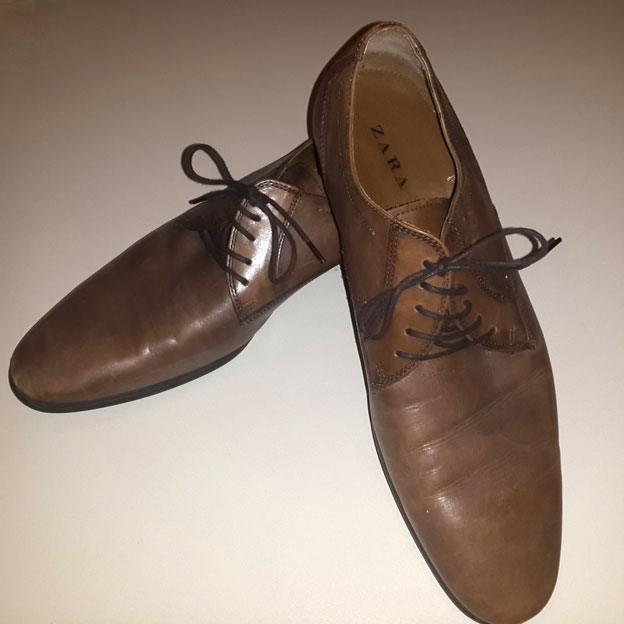
In 2009, two years before the start of the Syrian revolution, a young man called Huthaifah saw a pair of shoes at a shopping mall in Aleppo. He bought them, but suddenly decided not to put them on - he would only wear them when he saw his mother again.
Huthaifah had not seen his mother for six years. She'd been living in the UK since 2003, and there was no chance of Huthaifah getting a visa to visit.
For his mother to travel to Syria, though, was unthinkable. Thirty years earlier, she had fled the country carrying nothing but Huthaifah - then just a few months old - wrapped in a blanket.
The boy had been born in Aleppo in November 1979 - a city simmering with unrest. Hafez al-Assad, the father of Syria's current president, had been in power for almost a decade and was cracking down hard on opponents from the Muslim Brotherhood. The following spring soldiers sealed off the city's most troublesome neighbourhoods and began a house-by-house search for dissenters.
One of the people they arrested was Huthaifah's father, a 20-year-old student at Aleppo University. His wife, Fadua, was out with Huthaifah at the time, and as soon as she heard about the arrest, she knew she would be next. So she took a bus south with the baby on her lap and escaped into Jordan.
'I ask my friends if they can bring me some sand from Syria'
And so Huthaifah grew up in exile, first in Jordan and later in Saudi Arabia and Abu Dhabi. Syria was never far away. It was there in the food, in the songs, in the stories told by his mother and his stepfather - Fadua had remarried after realising that Huthaifah's father was almost certainly dead, or if alive, would never be released.
But then, when he was 18, Huthaifah decided to go back to Aleppo. He wanted to study, and the family couldn't afford the fees in Abu Dhabi. Fadua was terrified at the thought of her son returning to Syria and tried to stop him, but Huthaifah was adamant.
He enrolled at Aleppo University, and despite harassment from the security services - who immediately identified him as the son of the man they had arrested almost 20 years earlier - he graduated, and got a job as a sales representative with SyriaTel, the national mobile phone network.
Fadua still worried about her eldest son, but while she moved from Abu Dhabi to the UK, with Huthaifah's half-brothers and sisters, he continued to thrive. He became a regional sales manager, bought a car, and got married.
And then one day he entered the Aleppo branch of Zara, the Spanish clothing chain, and saw the shoes.
"I was buying clothes for work. I had to look smart," Huthaifah says. "I found the shoes there and I liked them. Later, I told my wife that I will keep the shoes in my cupboard until I see my mum. I made a vow to God. It was like a wish, you know?"
Two years later, with the shoes still unworn, revolt broke out in the southern town of Deraa. Protests against the regime of Bashar al-Assad spread quickly to all of Syria's major cities, including Aleppo. Huthaifah was among those who went out on to the streets.
"I joined the protest against Assad from the first day," says Huthaifah. "When people were still thinking… that it would come to nothing, I believed that something was happening, something against Assad. So I joined them.
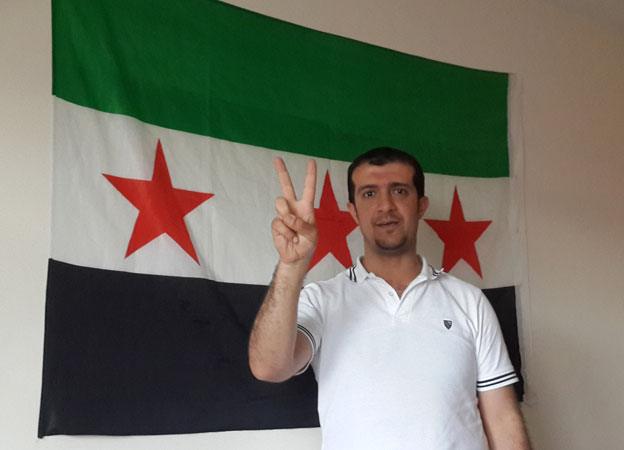
Huthaifah standing next to a revolutionary flag
"In the beginning of the revolution, from deep in my heart I was supporting them. I was going to ask for freedom with the other people. Then we realised that there were dozens of mukhabarat [secret police] everywhere in the protests. They were shouting for freedom, but really they were just collecting names and taking photos. I was still going, but I was covering my face, I was hiding my car.
"When people started to come into Aleppo from villages that had been destroyed by the regime, we were helping these families by providing accommodation, bringing food… We were collecting money from our friends in secret, buying clothes, blankets. Everything was in secret. I was frightened all the time."
By the spring of 2012 the optimism of the uprising was already disintegrating into the horror of civil war. Huthaifah saw protesters shot in the street by snipers. He saw bodies dumped outside a barracks by soldiers of the regime. "Every day walking on that street we saw a lot of people beside the garbage, dead. They killed them, and then they just threw them beside the garbage."
When they arrested one of his best friends, Mazen al-Rihawi - a colleague from SyriaTel and a leader of the effort to help injured and displaced people - it felt like things were closing in. "They took him to the Jawwiyah [the most feared of Assad's security services] and they killed him there with his father and brother, and they threw the bodies on the street. He was a very kind man."
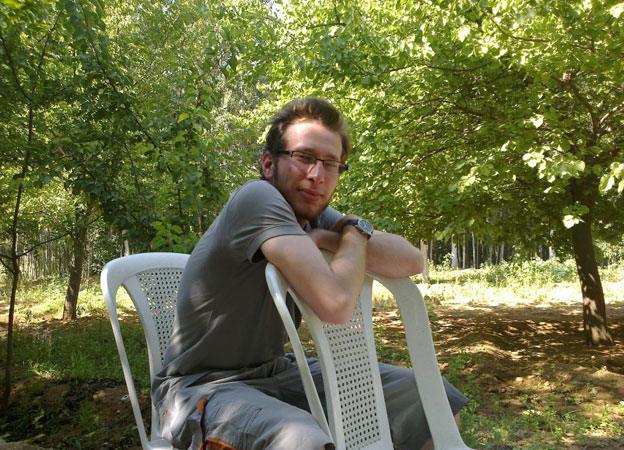
Huthaifah's friend, Mazen al-Rihawi
Then bombs started falling on eastern Aleppo. Huthaifah began carrying the shoes everywhere he went. He wrapped them inside three or four carrier bags, convincing himself that everything would be all right if he could only keep the shoes safe from harm.
"The shoes were always with me. When I went from my house to my work, or to my wife's family's house, they were always with me, in the car… I was so afraid about the shoes. Because it was my dream to see my mum. They were not just shoes for me. It was a dream that I will see my family, that one day I will wear these shoes."
In the summer of 2012 Huthaifah got a call summoning him to report to the military security headquarters in Aleppo. That same night, he got a warning from a friend: "Don't go. They know you're working to help the doctors treating injured protesters. You have to get out of Syria."
Huthaifah took his wife and son to a small house he'd built in the countryside a few miles out of Aleppo. "We were safe there. I'd just finished building the house and no-one knew about it." From the safe house, Huthaifah collected money that he'd banked with friends and bought canisters of petrol on the black market.
Fifteen days later he drove to Turkey with his wife, his baby boy, Zaid, and his Zara shoes.
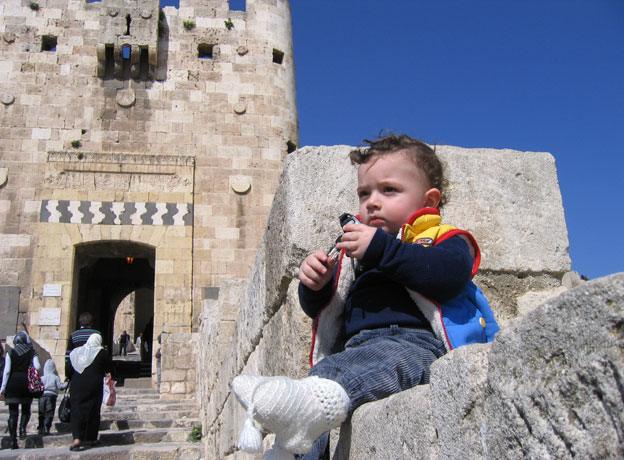
Huthaifah's son, Zaid, at the citadel in Aleppo before they fled
Leaving his family in a rented house in Mersin, Turkey, Huthaifah set off for Europe. It was a journey that cost him all his savings and took him - in the hands of corrupt and incompetent smugglers - through Egypt, Ghana, and Togo, back through Egypt to Turkey, and then overland, hidden for days inside a lorry, until he arrived in the Netherlands.
The shoes stayed, unworn, in his bag.
Finally, in 2013, he was granted asylum. Within months he had a ticket to visit his mother in the UK, and in July 2014, Huthaifah landed at Manchester airport.
It had been 11 years.
Fadua and the family were waiting. As soon as he was through security, Huthaifah went into the bathroom to put on his Zara shoes.
"The shoes were in my suitcase, so I opened it and took them out. I put them on there, in the bathroom, and I walked out to see my mum. It was one of the best moments of my life. After all this long time, I saw my family again."
Huthaifah stayed with his family in the UK for two weeks before returning to Holland. He has now brought his wife and son over from Turkey and is learning Dutch, studying for a master's degree, and working to build a new life in Holland.
He had never been able to find out anything about his father while he was in Syria. But in 2014, Huthaifah found a document online, listing his father's name among hundreds, possibly thousands, massacred in their cells on 27 June 1980, the day after a failed assassination attempt on the Syrian president.
Huthaifah keeps the shoes in a bag in the cupboard and wears them only on very special occasions. "My wife thinks I am mad, I know," he says. "But she also understands that these shoes mean a lot to me."

What refugees carried out of Syria
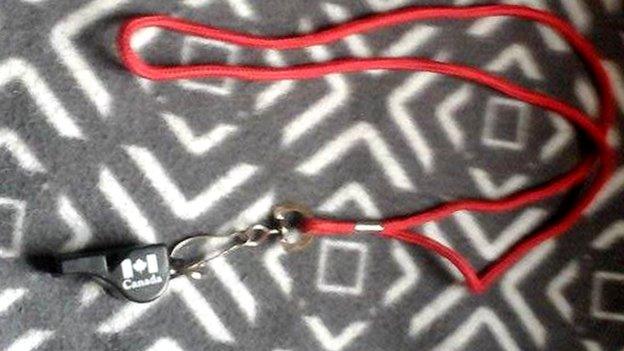
"The only thing I brought with me from Syria was a whistle," writes Firas. "I trained as a sports teacher in Damascus. My coach, who was also a great friend of mine, gave me this whistle in 2008, when I qualified. It reminds me of my first day at work when I was young and happily employed. It also reminds me of my coach. He was kidnapped in Damascus and later killed, even after his family paid a ransom."
Tweet the one thing you would take if forced to flee your country, using the hashtags #whatwouldyoutake? and #Syrianjourney Please include images and/or video - these may be used in a follow-up report by BBC Arabic.

Subscribe to the BBC News Magazine's email newsletter to get articles sent to your inbox.